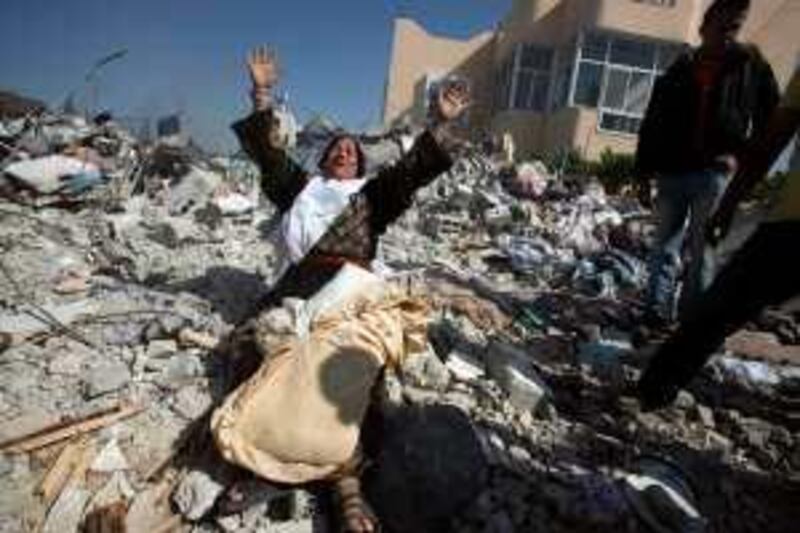RAMALLAH // Hamas and the Palestinian Authority in the West Bank condemned the killing yesterday of a Hamas militant near Hebron by the Israeli army as an illegal assassination. Ali Suweiti, 42, a member of the Izzedine al Qassam Brigades, was apparently killed when he refused to surrender to Israeli troops who had surrounded the house where he was hiding in the village of Beit Awwa. The Israeli army said in a statement that soldiers had called on him to give himself up.
"Suweiti refused and opened fire at the forces, who then used engineering tools in addition to firing at the building's exterior wall, in order to cause him to surrender. The terrorist continued to fire at the force, and was ultimately killed," the army said. Hamas called the pre-dawn killing an "assassination", and said Israel was trying to destroy any Palestinian resistance. "The assassination of this al Qassam commander is a dangerous crime, which comes in the context of the occupation's determination to eliminate the forces of the resistance, and especially the al Qassam Brigades in the West Bank," Sami Abu Zuhri, a Hamas spokesman, said.
The office of Salam Fayyad, the Palestinian prime minister, echoed the accusation and said the Palestinian government "condemns the Israeli policy of assassinations and the ensuing undermining of the PA's efforts" in the West Bank. The Palestinian Authority (PA) in the West Bank under Mr Fayyad has won praise from international actors for its efforts to impose security in Palestinian-controlled areas. But Palestinian officials have repeatedly denounced continued Israel army incursions in those areas, which they say undermine not only the efforts of the PA's security forces, but their credibility among Palestinians.
Yesterday, Fawzi Barhoum, another Hamas spokesman, urged the PA to "set the hand of resistance in the West Bank free to curb the Israeli aggression". Mr Barhoum told one foreign news agency that continued security co-ordination between Israel and the PA in the West Bank only "means the deaths of our people". Suweiti had been wanted by Israel for several years. He was accused of involvement in an ambush in 2004 of an Israeli military jeep in which one soldier was killed.
He had been holed up in the house of a relative that, as is standard Israeli practice, was subsequently demolished, a form of punishment designed to deter Palestinians from sheltering wanted men on their property. Accounts of yesterday's incident differ. Palestinian media reports suggest the army's version that a shoot-out had occurred was wrong and that although there had been clashes, they were with nearby villagers, who had been dispersed by tear gas and rubber-coated bullets.
It is also not clear whether Suweiti was shot dead or was killed when the house was demolished around him. The Israeli army has a long record of extrajudicial killings of Palestinians it accuses of involvement in military activities against it. Most recently, B'Tselem, an Israeli human rights group, urged the Israeli army to investigate the killing of three Palestinians in Nablus in December, an incident, the group said, that bore all the hallmarks of an unlawful killing.
Indeed, Haaretz, an Israeli newspaper, has reported on army operation briefings that the newspaper says show the Israeli army has repeatedly approved assassinations of wanted Palestinians even when the possibility of capturing the men was present. That would violate not only international law but Israeli law. Israeli law does not prohibit assassinations completely, but a high court ruling in December 2006 held that assassinations are permissible only if the target cannot be arrested, and that "harm to innocent civilians will be legal only if it meets the demands of proportionality".
It is not clear whether such harm includes the destruction of civilian property. The killing comes as George Mitchell, the US Middle East envoy concluded his three-day visit on Sunday with another meeting with Benjamin Netanyahu, the Israeli prime minister, who announced his willingness to "have a frank exchange of views" on core issues with the Palestinians in any resumed negotiations. Yesterday in an interview on Israel's Channel 2 TV, the Palestinian president, Mahmoud Abbas, signalled that he was ready to start indirect peace talks with Israel, after weeks of hesitation.
The talks had been stalled after Israel infuriated Washington and the Palestinians last month by announcing a big new East Jerusalem housing development. But municipal officials have said the Israeli government has effectively frozen new construction in the disputed city. Mr Abbas said he will present the US proposal for talks to the Arab League this week and the Palestinians "hope that the reply will be positive".
@Email:okarmi@thenational.ae * With additional reporting by Associated Press





